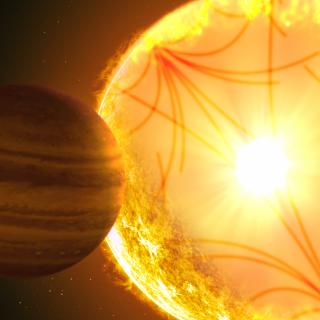Bibcode
García, R. A.; Jiménez, A.; Mathur, S.; Ballot, J.; Eff-Darwich, A.; Jiménez-Reyes, S. J.; Pallé, P. L.; Provost, J.; Turck-Chièze, S.
Referencia bibliográfica
Astronomische Nachrichten, Vol.329, Issue 5, p.476
Fecha de publicación:
6
2008
Número de citas
60
Número de citas referidas
33
Descripción
Since the beginning of this century we have attended a blooming of the
gravity-mode research thanks to the unprecedented quality of the data
available, either from space with SoHO, or from the ground-based
networks as BiSON or GONG. From the first upper limit of the
gravity-mode amplitudes fixed at 10 mm/s at 200 μHz given by
Appourchaux et al. (2000), on one hand, a peak was supposed to be a
component of the ℓ = 1, n = 1 mixed mode (García et al.
2001a, 2001b; Gabriel et al. 2002) and, on the other hand, a couple of
patterns - multiplets - were attributed to gravity modes
(Turck-Chièze et al. 2004; Mathur et al. 2007). One of these
patterns, found around 220 μHz, could be labeled as the ℓ = 2, n
=-3 g mode, which is expected to be the one with the highest surface
amplitude (Cox & Guzik 2004). Finally, in 2007, García et al.
were able to measure the fingertips of the dipole gravity modes looking
for their asymptotic properties. In the present paper we present an
update of the recent developments on this subject with special attention
to the 220 μHz region, the dipole asymptotic properties and the
impact of the incoming g-mode observations on the knowledge of the solar
structure and rotation profile.
Proyectos relacionados

Sismología Solar y Estelar y Búsqueda de Exoplanetas
Los objetivos genéricos de este Proyecto son: 1) el estudio de la estructura y dinámica del interior solar, 2) la extensión de dicho estudio al caso de otras estrellas, 3) la búsqueda y caracterización de planetas extrasolares por métodos fotométricos (principalmente mediante el método de tránsitos) y espectroscópico (variaciones en la velocidad
Savita
Mathur